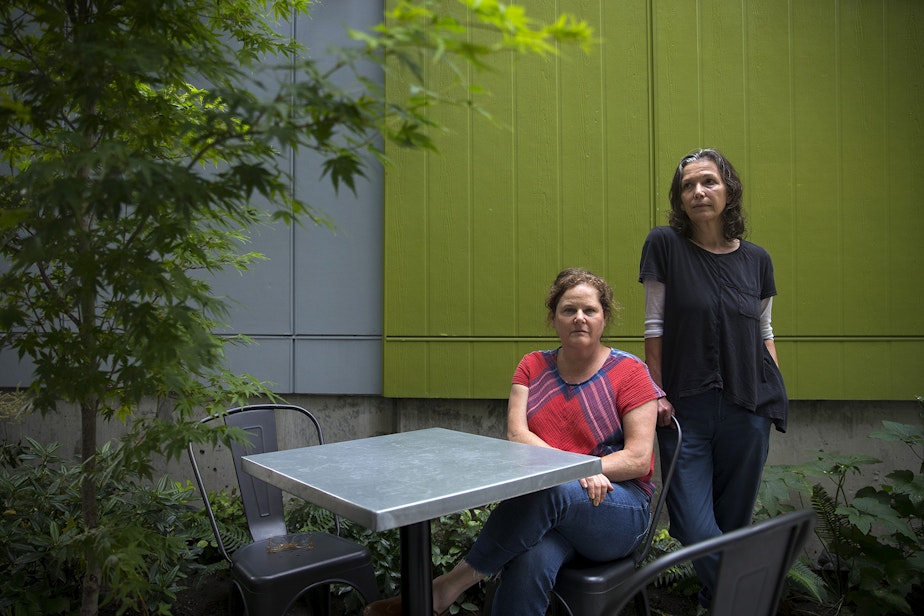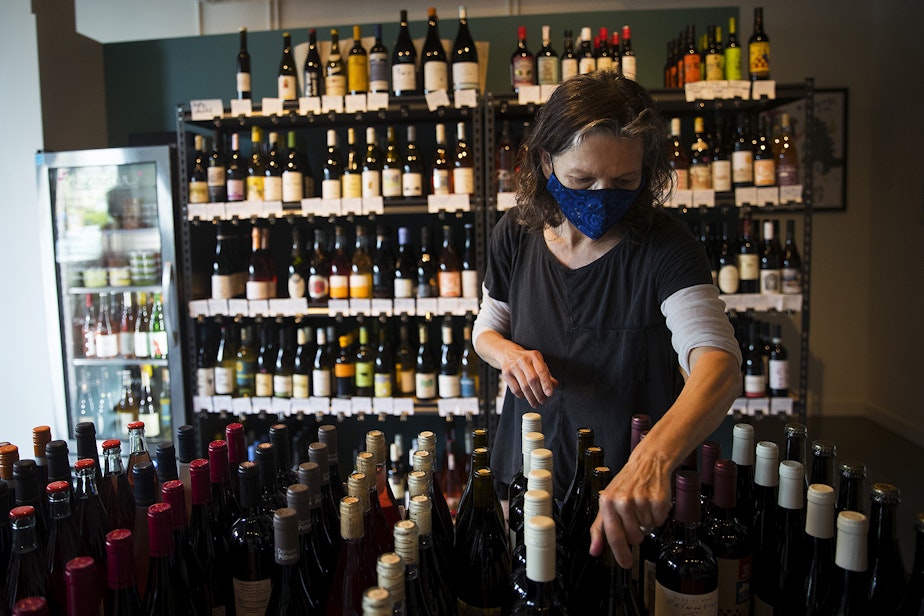'It's nervous-making to be operating a business in this way, at this time'

Everyone has a story. That was the mantra as KUOW reporters set out to chronicle the lives of people who live and work on a small block in Seattle’s Beacon Hill neighborhood in the time of Covid-19. Read the stories at covidontheblock.com.
When Gov. Jay Inslee issued a statewide lockdown in March, Petite Soif, a wine bar on Beacon Hill, had been open four months.
“We were nervous about what was going to happen,” said co-owner Shawn Mead.
Like many small businesses, the wine bar is struggling to survive. As a business that relies on people gathering, it has reinvented itself almost monthly since the pandemic started.
Late March
Co-owner Lauren Feldman spent a lot of time putting together their website, something she’s never done before.
Sponsored
“I’m a cook, I’m not a technical person at all,” she said.
With websites launched for Petite Soif and Vif, their first wine and coffee shop in Fremont, online sales took off. “People were buying wines like crazy – it was amazing!”
They got creative with their specials. “We had a pack called ‘Stay at Home 7,’” said Mead. “We had seven bottles of wine, you know, times like these!”
Sponsored
They also offered pantry and lunch items.
Mead and Feldman met in 1999 at the restaurant Campagne, where Mead was the wine director and Feldman was the pastry chef. Their first venture, Vif, a restaurant cum wine shop in Fremont, focuses on natural wines.
Mead said over the years they’ve been offered opportunities to open a second place, but the spaces didn’t feel right. When they saw the Beacon Hill spot, they knew they wanted to be part of the neighborhood. They envisioned a place common in Europe where people can stop by on their way home from work for a drink and light bite, or a place to pick up a bottle for dinner.
Petite Soif was just establishing itself in the community when the pandemic hit.

Sponsored
Early April
The weather was warmer than usual, and people were out walking. Mead and Feldman moved the shelves of wine closer to the windows, to create what Mead calls a “wine window shopping experience.”
“We have definitely seen a lot of people have been stuck at home taking walks in the neighborhood discovering us, realizing we’re here,” she said.
Some have become customers. Mead says it’s helped keep their presence in the neighborhood.
June 11
Sponsored
When I visited Mead and Feldman in June, King County was in Phase 1.5 – out of lockdown, with indoor retail, restaurant and personal services allowed, albeit with restrictions.
The shop was still set up for window shopping and curbside pick-up. In addition to wine and pantry items, the kitchen was open, and Anthony Dao, the cook, made focaccia and other foods to go.
“We’re paying attention to how people’s buying patterns are evolving and we’re evolving with that,” said Feldman.
The county is poised for Phase 2, where restaurants can offer dining service, but at 50 capacity. But Feldman is not sure they’re ready to make that transition.
“We are still really wary of what’s going to happen, I mean with all the news lately about spikes in other states because they opened up too soon, we’re being cautious,” she said.
Sponsored
Plus the math wouldn’t pencil out. As much as they wanted to hire back their staff, they could have only four tables for service – not enough to stay open.
The pandemic had been an emotional roller coaster ride. Some days felt like things would be okay. But other times, Feldman and Mead wondered if they would lose everything, including their retirement.
“That’s what we have to face every day as we move forward, like whether or not our business will weather this storm,” Mead said. “And we’re not alone in that.”
Protests against police violence, then in its second week, didn’t appear to be waning. Since then, sales have dropped said Mead. “I don’t know if that’s because our clients are at the protests, or if our clients are hunkered down because they’re afraid to go out in the protests because of a resurgence of the Coronavirus.”
The unrest is also causing a lot of reflection, a lot of conversations with their staff.
Sponsored
“My initial reaction, I think, was just to be in shock and slightly paralyzed,” said Feldman. “And then slowly you just snap out of that and realize, I need to educate myself, I need to read about what’s really going on here.”
Like many local businesses, the shop was closing the next day in support of the silent march organized by Black Lives Matter Seattle-King County.
July 10
A month later, I returned to Petite Soif. I noticed on their Instagram account that the patio was open for seating. I wondered what changed their minds. Mead said business continued to plummet.
“We got really nervous honestly about how we’re going to pay our bills and move forward,” she said.
It was a hard decision and after discussions with their staff, they decided to offer outdoor only dining.
They came up with “service etiquette,” like requiring people to wear masks, rigorous cleaning, and serving food on compostable plates.
Mead took me to the back courtyard where their husbands had dug out the middle and filled it with gravel. Two maple trees anchor the space. Native plants line the perimeter.
There are four tables safely spaced apart, though in pre-Covid times, Mead said they would have added three more to squeeze more people in. But they’re trying to make the best with the current restrictions.
So far, people have been enjoying the space.
“People seem anxious to be out,” said Mead. She said they would have been fine sticking with online sales and wait a little longer before offering dining services again.
“It’s nervous-making to be operating a business in this way at this time,” Mead said. “Honestly, we almost feel like we don’t have a choice.”

